Report on Leadership and Management at General Electric (GE)
VerifiedAdded on 2023/01/10
|7
|2044
|74
Report
AI Summary
This report provides a comprehensive analysis of leadership and management practices at General Electric (GE), examining the contributions of key figures such as Jack Welch, Jeff Immelt, and Henry Lawrence Culp Jr. It explores the various managerial skills and leadership qualities demonstrated by these leaders, highlighting their respective strengths and weaknesses in different situations. The report delves into the evolution of GE's leadership styles, comparing and contrasting the approaches of each leader and evaluating their impact on the company's performance and strategic direction. Furthermore, it references relevant leadership theories, such as situational and contingency theories, to provide a theoretical framework for understanding the effectiveness of different leadership approaches within the context of GE's organizational environment and market changes. The report concludes with a summary of the findings, emphasizing the crucial role of effective leadership in achieving organizational goals and adapting to dynamic business environments.

General Electric
Report
Report
Paraphrase This Document
Need a fresh take? Get an instant paraphrase of this document with our AI Paraphraser
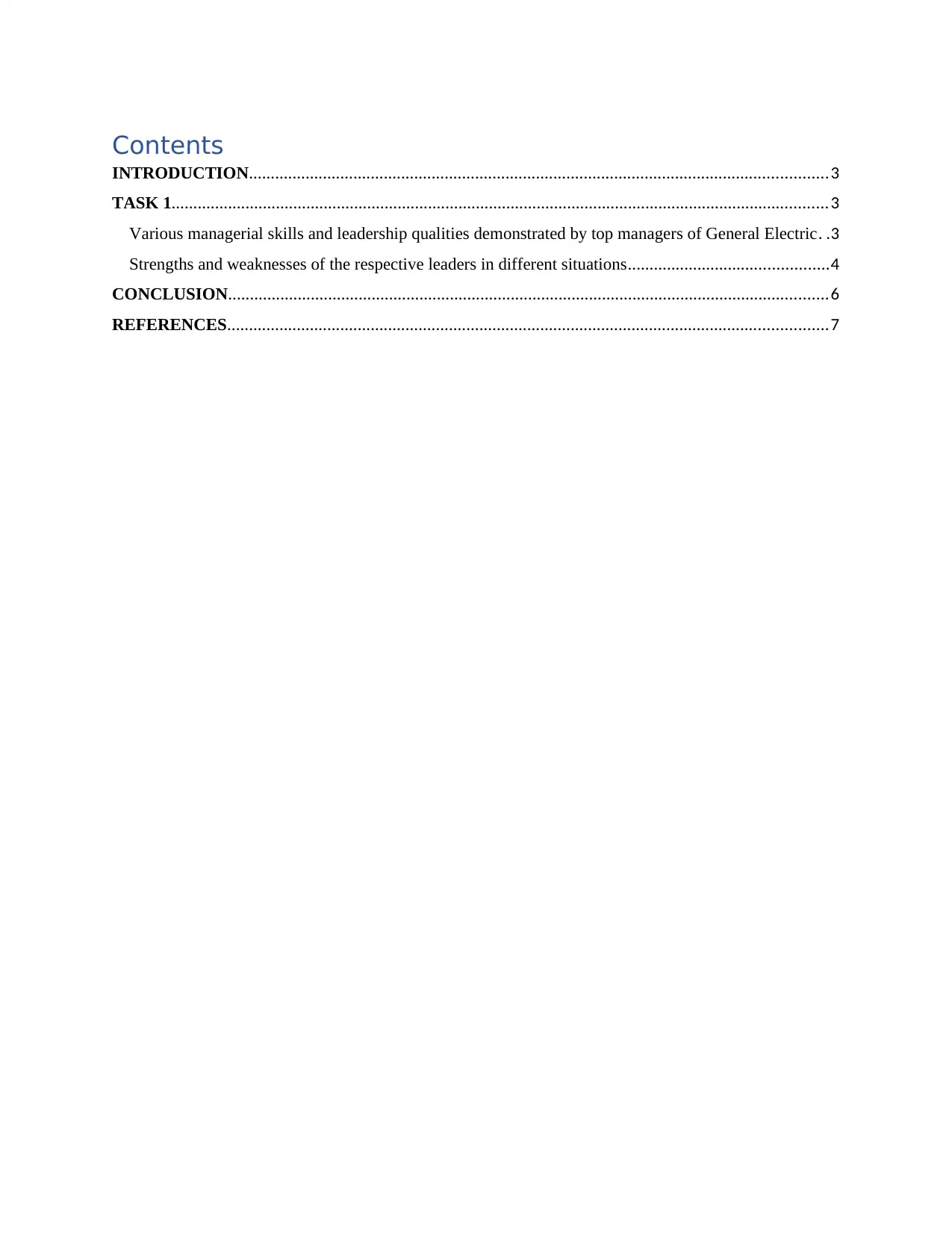
Contents
INTRODUCTION.....................................................................................................................................3
TASK 1.......................................................................................................................................................3
Various managerial skills and leadership qualities demonstrated by top managers of General Electric. .3
Strengths and weaknesses of the respective leaders in different situations..............................................4
CONCLUSION..........................................................................................................................................6
REFERENCES..........................................................................................................................................7
INTRODUCTION.....................................................................................................................................3
TASK 1.......................................................................................................................................................3
Various managerial skills and leadership qualities demonstrated by top managers of General Electric. .3
Strengths and weaknesses of the respective leaders in different situations..............................................4
CONCLUSION..........................................................................................................................................6
REFERENCES..........................................................................................................................................7
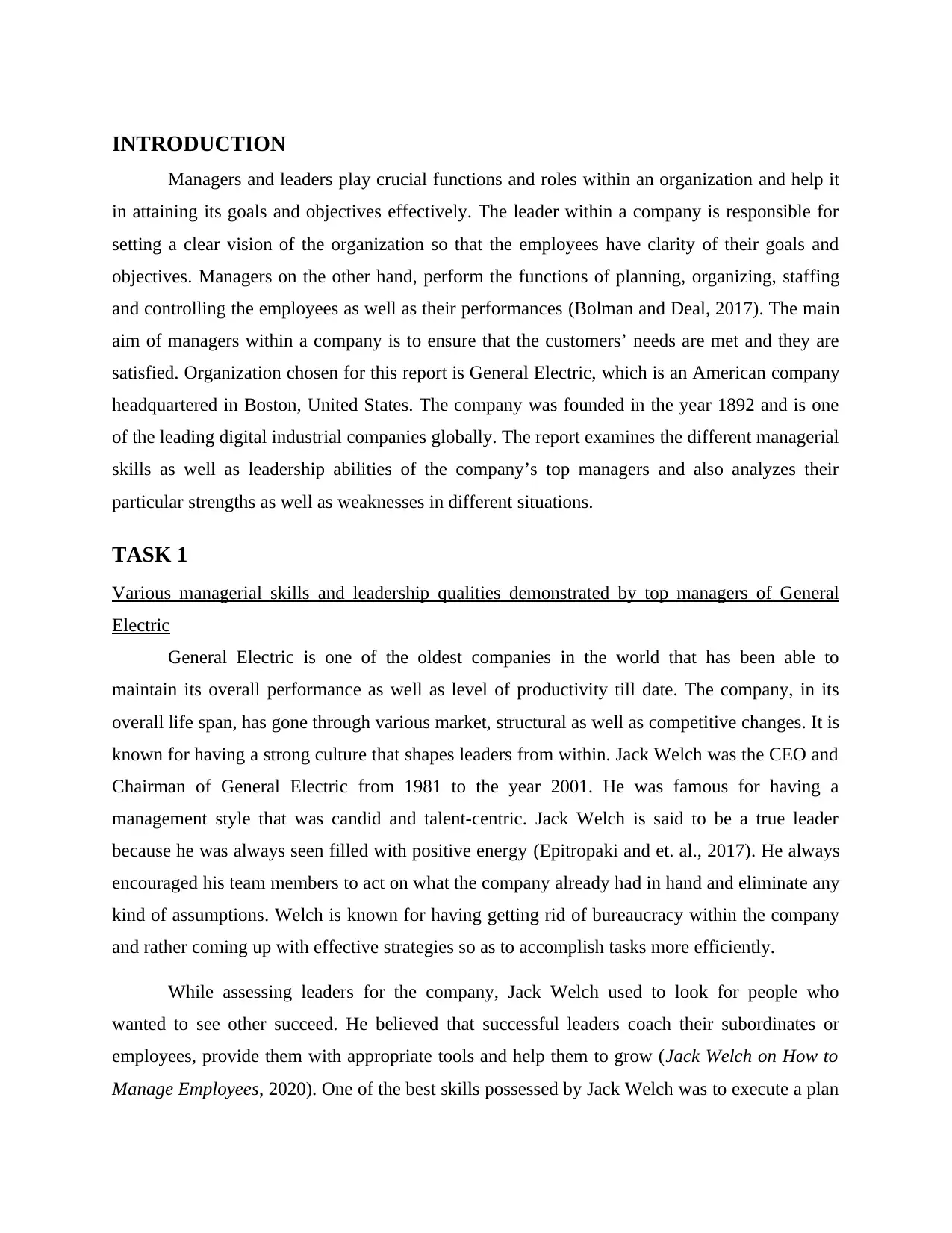
INTRODUCTION
Managers and leaders play crucial functions and roles within an organization and help it
in attaining its goals and objectives effectively. The leader within a company is responsible for
setting a clear vision of the organization so that the employees have clarity of their goals and
objectives. Managers on the other hand, perform the functions of planning, organizing, staffing
and controlling the employees as well as their performances (Bolman and Deal, 2017). The main
aim of managers within a company is to ensure that the customers’ needs are met and they are
satisfied. Organization chosen for this report is General Electric, which is an American company
headquartered in Boston, United States. The company was founded in the year 1892 and is one
of the leading digital industrial companies globally. The report examines the different managerial
skills as well as leadership abilities of the company’s top managers and also analyzes their
particular strengths as well as weaknesses in different situations.
TASK 1
Various managerial skills and leadership qualities demonstrated by top managers of General
Electric
General Electric is one of the oldest companies in the world that has been able to
maintain its overall performance as well as level of productivity till date. The company, in its
overall life span, has gone through various market, structural as well as competitive changes. It is
known for having a strong culture that shapes leaders from within. Jack Welch was the CEO and
Chairman of General Electric from 1981 to the year 2001. He was famous for having a
management style that was candid and talent-centric. Jack Welch is said to be a true leader
because he was always seen filled with positive energy (Epitropaki and et. al., 2017). He always
encouraged his team members to act on what the company already had in hand and eliminate any
kind of assumptions. Welch is known for having getting rid of bureaucracy within the company
and rather coming up with effective strategies so as to accomplish tasks more efficiently.
While assessing leaders for the company, Jack Welch used to look for people who
wanted to see other succeed. He believed that successful leaders coach their subordinates or
employees, provide them with appropriate tools and help them to grow (Jack Welch on How to
Manage Employees, 2020). One of the best skills possessed by Jack Welch was to execute a plan
Managers and leaders play crucial functions and roles within an organization and help it
in attaining its goals and objectives effectively. The leader within a company is responsible for
setting a clear vision of the organization so that the employees have clarity of their goals and
objectives. Managers on the other hand, perform the functions of planning, organizing, staffing
and controlling the employees as well as their performances (Bolman and Deal, 2017). The main
aim of managers within a company is to ensure that the customers’ needs are met and they are
satisfied. Organization chosen for this report is General Electric, which is an American company
headquartered in Boston, United States. The company was founded in the year 1892 and is one
of the leading digital industrial companies globally. The report examines the different managerial
skills as well as leadership abilities of the company’s top managers and also analyzes their
particular strengths as well as weaknesses in different situations.
TASK 1
Various managerial skills and leadership qualities demonstrated by top managers of General
Electric
General Electric is one of the oldest companies in the world that has been able to
maintain its overall performance as well as level of productivity till date. The company, in its
overall life span, has gone through various market, structural as well as competitive changes. It is
known for having a strong culture that shapes leaders from within. Jack Welch was the CEO and
Chairman of General Electric from 1981 to the year 2001. He was famous for having a
management style that was candid and talent-centric. Jack Welch is said to be a true leader
because he was always seen filled with positive energy (Epitropaki and et. al., 2017). He always
encouraged his team members to act on what the company already had in hand and eliminate any
kind of assumptions. Welch is known for having getting rid of bureaucracy within the company
and rather coming up with effective strategies so as to accomplish tasks more efficiently.
While assessing leaders for the company, Jack Welch used to look for people who
wanted to see other succeed. He believed that successful leaders coach their subordinates or
employees, provide them with appropriate tools and help them to grow (Jack Welch on How to
Manage Employees, 2020). One of the best skills possessed by Jack Welch was to execute a plan
⊘ This is a preview!⊘
Do you want full access?
Subscribe today to unlock all pages.

Trusted by 1+ million students worldwide
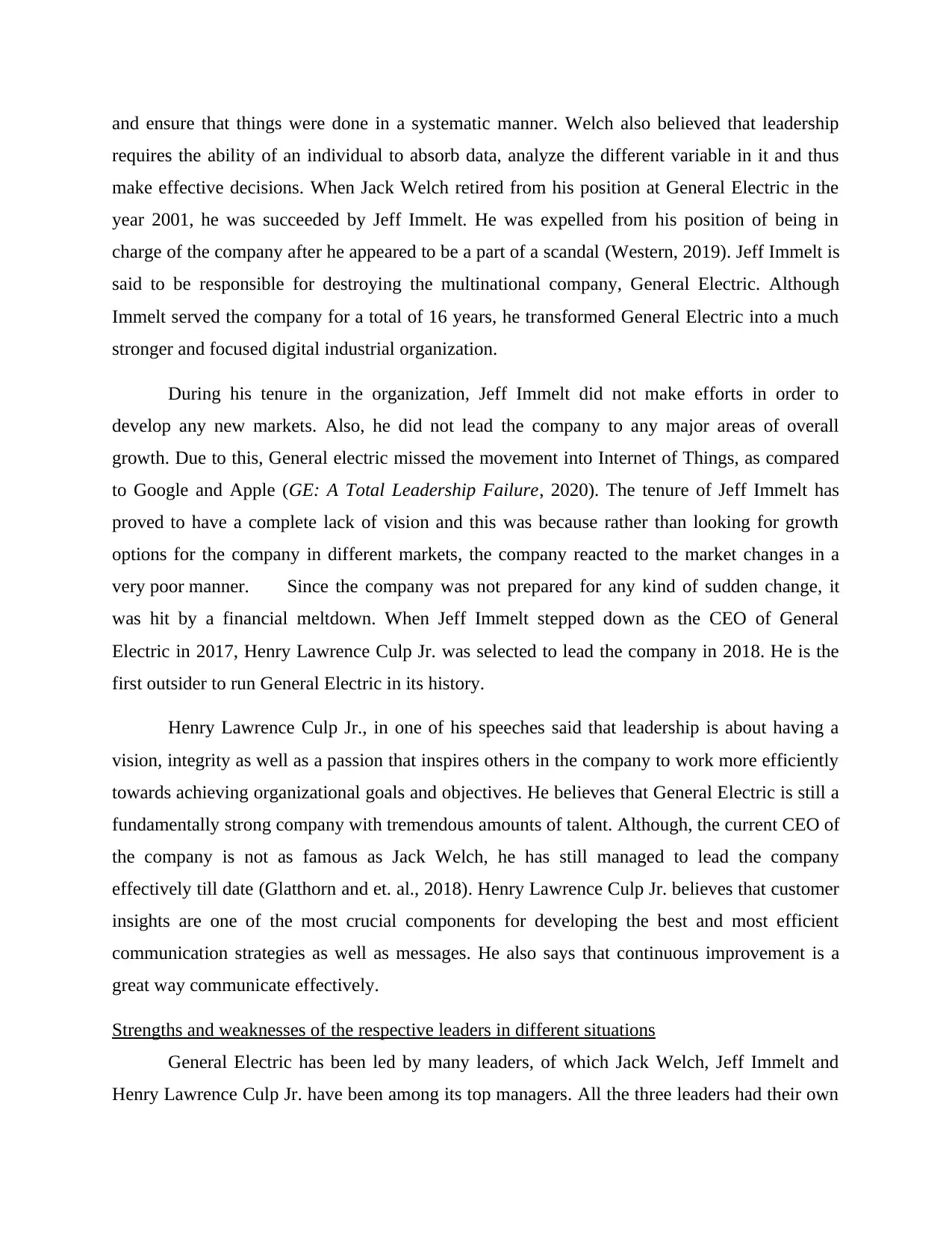
and ensure that things were done in a systematic manner. Welch also believed that leadership
requires the ability of an individual to absorb data, analyze the different variable in it and thus
make effective decisions. When Jack Welch retired from his position at General Electric in the
year 2001, he was succeeded by Jeff Immelt. He was expelled from his position of being in
charge of the company after he appeared to be a part of a scandal (Western, 2019). Jeff Immelt is
said to be responsible for destroying the multinational company, General Electric. Although
Immelt served the company for a total of 16 years, he transformed General Electric into a much
stronger and focused digital industrial organization.
During his tenure in the organization, Jeff Immelt did not make efforts in order to
develop any new markets. Also, he did not lead the company to any major areas of overall
growth. Due to this, General electric missed the movement into Internet of Things, as compared
to Google and Apple (GE: A Total Leadership Failure, 2020). The tenure of Jeff Immelt has
proved to have a complete lack of vision and this was because rather than looking for growth
options for the company in different markets, the company reacted to the market changes in a
very poor manner. Since the company was not prepared for any kind of sudden change, it
was hit by a financial meltdown. When Jeff Immelt stepped down as the CEO of General
Electric in 2017, Henry Lawrence Culp Jr. was selected to lead the company in 2018. He is the
first outsider to run General Electric in its history.
Henry Lawrence Culp Jr., in one of his speeches said that leadership is about having a
vision, integrity as well as a passion that inspires others in the company to work more efficiently
towards achieving organizational goals and objectives. He believes that General Electric is still a
fundamentally strong company with tremendous amounts of talent. Although, the current CEO of
the company is not as famous as Jack Welch, he has still managed to lead the company
effectively till date (Glatthorn and et. al., 2018). Henry Lawrence Culp Jr. believes that customer
insights are one of the most crucial components for developing the best and most efficient
communication strategies as well as messages. He also says that continuous improvement is a
great way communicate effectively.
Strengths and weaknesses of the respective leaders in different situations
General Electric has been led by many leaders, of which Jack Welch, Jeff Immelt and
Henry Lawrence Culp Jr. have been among its top managers. All the three leaders had their own
requires the ability of an individual to absorb data, analyze the different variable in it and thus
make effective decisions. When Jack Welch retired from his position at General Electric in the
year 2001, he was succeeded by Jeff Immelt. He was expelled from his position of being in
charge of the company after he appeared to be a part of a scandal (Western, 2019). Jeff Immelt is
said to be responsible for destroying the multinational company, General Electric. Although
Immelt served the company for a total of 16 years, he transformed General Electric into a much
stronger and focused digital industrial organization.
During his tenure in the organization, Jeff Immelt did not make efforts in order to
develop any new markets. Also, he did not lead the company to any major areas of overall
growth. Due to this, General electric missed the movement into Internet of Things, as compared
to Google and Apple (GE: A Total Leadership Failure, 2020). The tenure of Jeff Immelt has
proved to have a complete lack of vision and this was because rather than looking for growth
options for the company in different markets, the company reacted to the market changes in a
very poor manner. Since the company was not prepared for any kind of sudden change, it
was hit by a financial meltdown. When Jeff Immelt stepped down as the CEO of General
Electric in 2017, Henry Lawrence Culp Jr. was selected to lead the company in 2018. He is the
first outsider to run General Electric in its history.
Henry Lawrence Culp Jr., in one of his speeches said that leadership is about having a
vision, integrity as well as a passion that inspires others in the company to work more efficiently
towards achieving organizational goals and objectives. He believes that General Electric is still a
fundamentally strong company with tremendous amounts of talent. Although, the current CEO of
the company is not as famous as Jack Welch, he has still managed to lead the company
effectively till date (Glatthorn and et. al., 2018). Henry Lawrence Culp Jr. believes that customer
insights are one of the most crucial components for developing the best and most efficient
communication strategies as well as messages. He also says that continuous improvement is a
great way communicate effectively.
Strengths and weaknesses of the respective leaders in different situations
General Electric has been led by many leaders, of which Jack Welch, Jeff Immelt and
Henry Lawrence Culp Jr. have been among its top managers. All the three leaders had their own
Paraphrase This Document
Need a fresh take? Get an instant paraphrase of this document with our AI Paraphraser
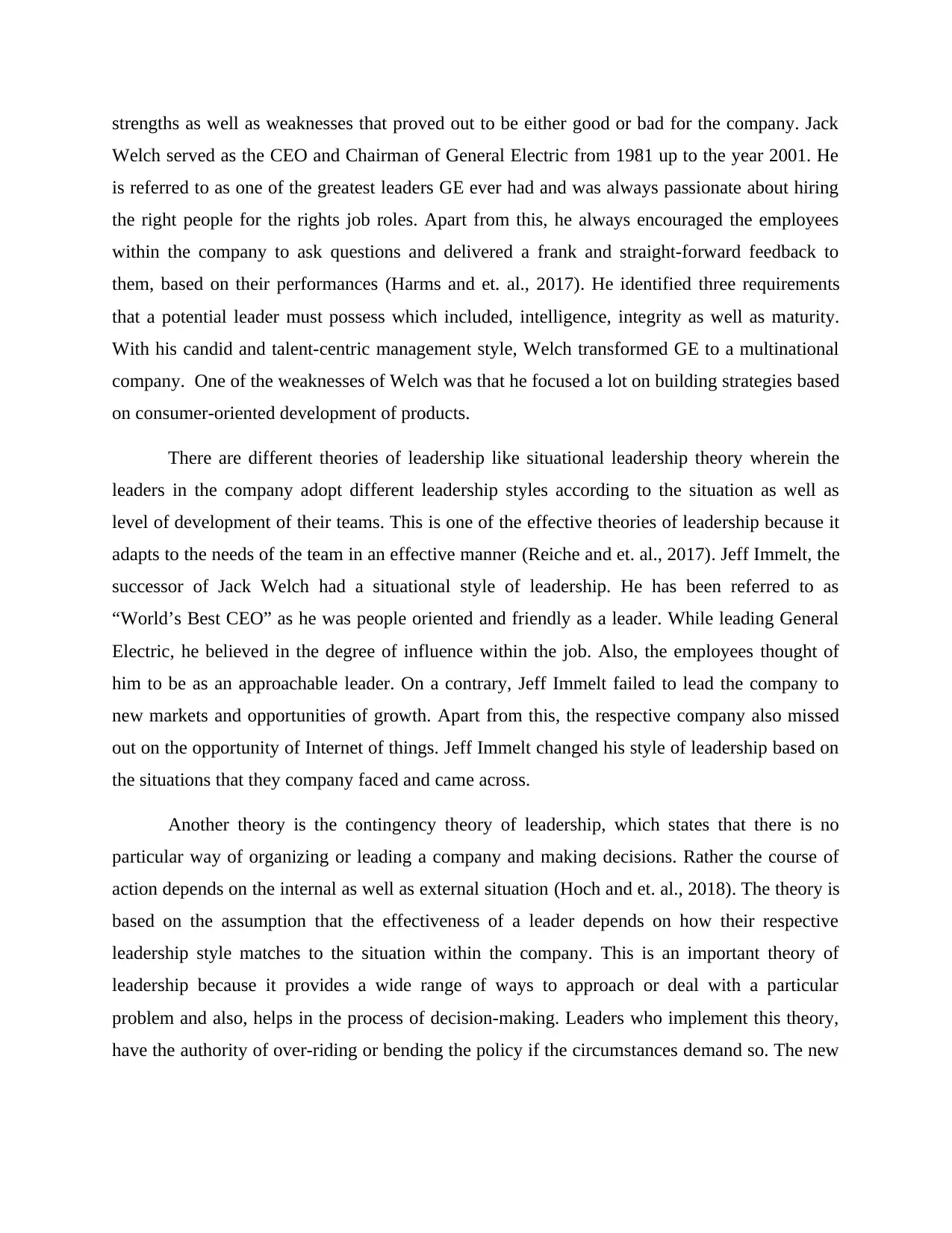
strengths as well as weaknesses that proved out to be either good or bad for the company. Jack
Welch served as the CEO and Chairman of General Electric from 1981 up to the year 2001. He
is referred to as one of the greatest leaders GE ever had and was always passionate about hiring
the right people for the rights job roles. Apart from this, he always encouraged the employees
within the company to ask questions and delivered a frank and straight-forward feedback to
them, based on their performances (Harms and et. al., 2017). He identified three requirements
that a potential leader must possess which included, intelligence, integrity as well as maturity.
With his candid and talent-centric management style, Welch transformed GE to a multinational
company. One of the weaknesses of Welch was that he focused a lot on building strategies based
on consumer-oriented development of products.
There are different theories of leadership like situational leadership theory wherein the
leaders in the company adopt different leadership styles according to the situation as well as
level of development of their teams. This is one of the effective theories of leadership because it
adapts to the needs of the team in an effective manner (Reiche and et. al., 2017). Jeff Immelt, the
successor of Jack Welch had a situational style of leadership. He has been referred to as
“World’s Best CEO” as he was people oriented and friendly as a leader. While leading General
Electric, he believed in the degree of influence within the job. Also, the employees thought of
him to be as an approachable leader. On a contrary, Jeff Immelt failed to lead the company to
new markets and opportunities of growth. Apart from this, the respective company also missed
out on the opportunity of Internet of things. Jeff Immelt changed his style of leadership based on
the situations that they company faced and came across.
Another theory is the contingency theory of leadership, which states that there is no
particular way of organizing or leading a company and making decisions. Rather the course of
action depends on the internal as well as external situation (Hoch and et. al., 2018). The theory is
based on the assumption that the effectiveness of a leader depends on how their respective
leadership style matches to the situation within the company. This is an important theory of
leadership because it provides a wide range of ways to approach or deal with a particular
problem and also, helps in the process of decision-making. Leaders who implement this theory,
have the authority of over-riding or bending the policy if the circumstances demand so. The new
Welch served as the CEO and Chairman of General Electric from 1981 up to the year 2001. He
is referred to as one of the greatest leaders GE ever had and was always passionate about hiring
the right people for the rights job roles. Apart from this, he always encouraged the employees
within the company to ask questions and delivered a frank and straight-forward feedback to
them, based on their performances (Harms and et. al., 2017). He identified three requirements
that a potential leader must possess which included, intelligence, integrity as well as maturity.
With his candid and talent-centric management style, Welch transformed GE to a multinational
company. One of the weaknesses of Welch was that he focused a lot on building strategies based
on consumer-oriented development of products.
There are different theories of leadership like situational leadership theory wherein the
leaders in the company adopt different leadership styles according to the situation as well as
level of development of their teams. This is one of the effective theories of leadership because it
adapts to the needs of the team in an effective manner (Reiche and et. al., 2017). Jeff Immelt, the
successor of Jack Welch had a situational style of leadership. He has been referred to as
“World’s Best CEO” as he was people oriented and friendly as a leader. While leading General
Electric, he believed in the degree of influence within the job. Also, the employees thought of
him to be as an approachable leader. On a contrary, Jeff Immelt failed to lead the company to
new markets and opportunities of growth. Apart from this, the respective company also missed
out on the opportunity of Internet of things. Jeff Immelt changed his style of leadership based on
the situations that they company faced and came across.
Another theory is the contingency theory of leadership, which states that there is no
particular way of organizing or leading a company and making decisions. Rather the course of
action depends on the internal as well as external situation (Hoch and et. al., 2018). The theory is
based on the assumption that the effectiveness of a leader depends on how their respective
leadership style matches to the situation within the company. This is an important theory of
leadership because it provides a wide range of ways to approach or deal with a particular
problem and also, helps in the process of decision-making. Leaders who implement this theory,
have the authority of over-riding or bending the policy if the circumstances demand so. The new
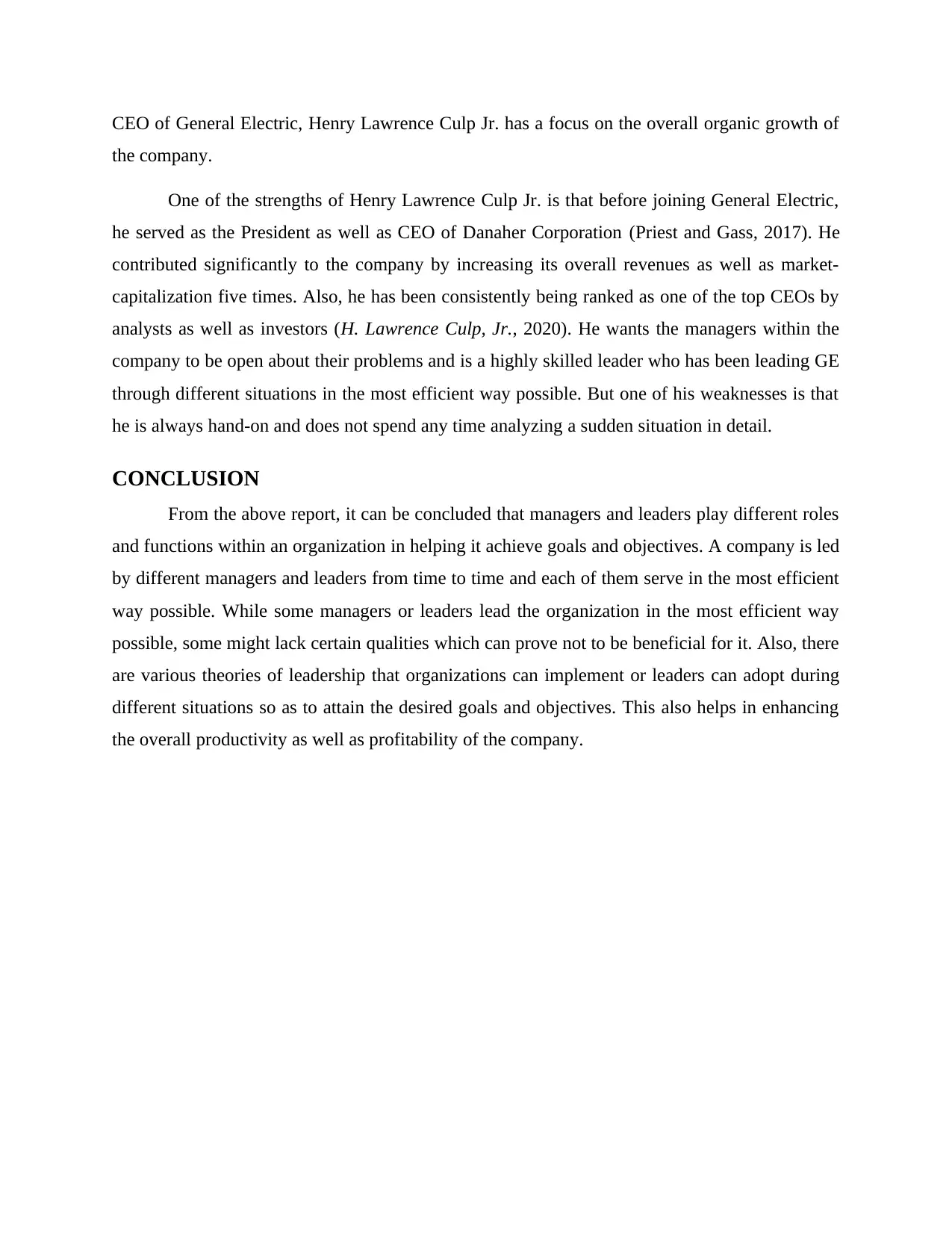
CEO of General Electric, Henry Lawrence Culp Jr. has a focus on the overall organic growth of
the company.
One of the strengths of Henry Lawrence Culp Jr. is that before joining General Electric,
he served as the President as well as CEO of Danaher Corporation (Priest and Gass, 2017). He
contributed significantly to the company by increasing its overall revenues as well as market-
capitalization five times. Also, he has been consistently being ranked as one of the top CEOs by
analysts as well as investors (H. Lawrence Culp, Jr., 2020). He wants the managers within the
company to be open about their problems and is a highly skilled leader who has been leading GE
through different situations in the most efficient way possible. But one of his weaknesses is that
he is always hand-on and does not spend any time analyzing a sudden situation in detail.
CONCLUSION
From the above report, it can be concluded that managers and leaders play different roles
and functions within an organization in helping it achieve goals and objectives. A company is led
by different managers and leaders from time to time and each of them serve in the most efficient
way possible. While some managers or leaders lead the organization in the most efficient way
possible, some might lack certain qualities which can prove not to be beneficial for it. Also, there
are various theories of leadership that organizations can implement or leaders can adopt during
different situations so as to attain the desired goals and objectives. This also helps in enhancing
the overall productivity as well as profitability of the company.
the company.
One of the strengths of Henry Lawrence Culp Jr. is that before joining General Electric,
he served as the President as well as CEO of Danaher Corporation (Priest and Gass, 2017). He
contributed significantly to the company by increasing its overall revenues as well as market-
capitalization five times. Also, he has been consistently being ranked as one of the top CEOs by
analysts as well as investors (H. Lawrence Culp, Jr., 2020). He wants the managers within the
company to be open about their problems and is a highly skilled leader who has been leading GE
through different situations in the most efficient way possible. But one of his weaknesses is that
he is always hand-on and does not spend any time analyzing a sudden situation in detail.
CONCLUSION
From the above report, it can be concluded that managers and leaders play different roles
and functions within an organization in helping it achieve goals and objectives. A company is led
by different managers and leaders from time to time and each of them serve in the most efficient
way possible. While some managers or leaders lead the organization in the most efficient way
possible, some might lack certain qualities which can prove not to be beneficial for it. Also, there
are various theories of leadership that organizations can implement or leaders can adopt during
different situations so as to attain the desired goals and objectives. This also helps in enhancing
the overall productivity as well as profitability of the company.
⊘ This is a preview!⊘
Do you want full access?
Subscribe today to unlock all pages.

Trusted by 1+ million students worldwide
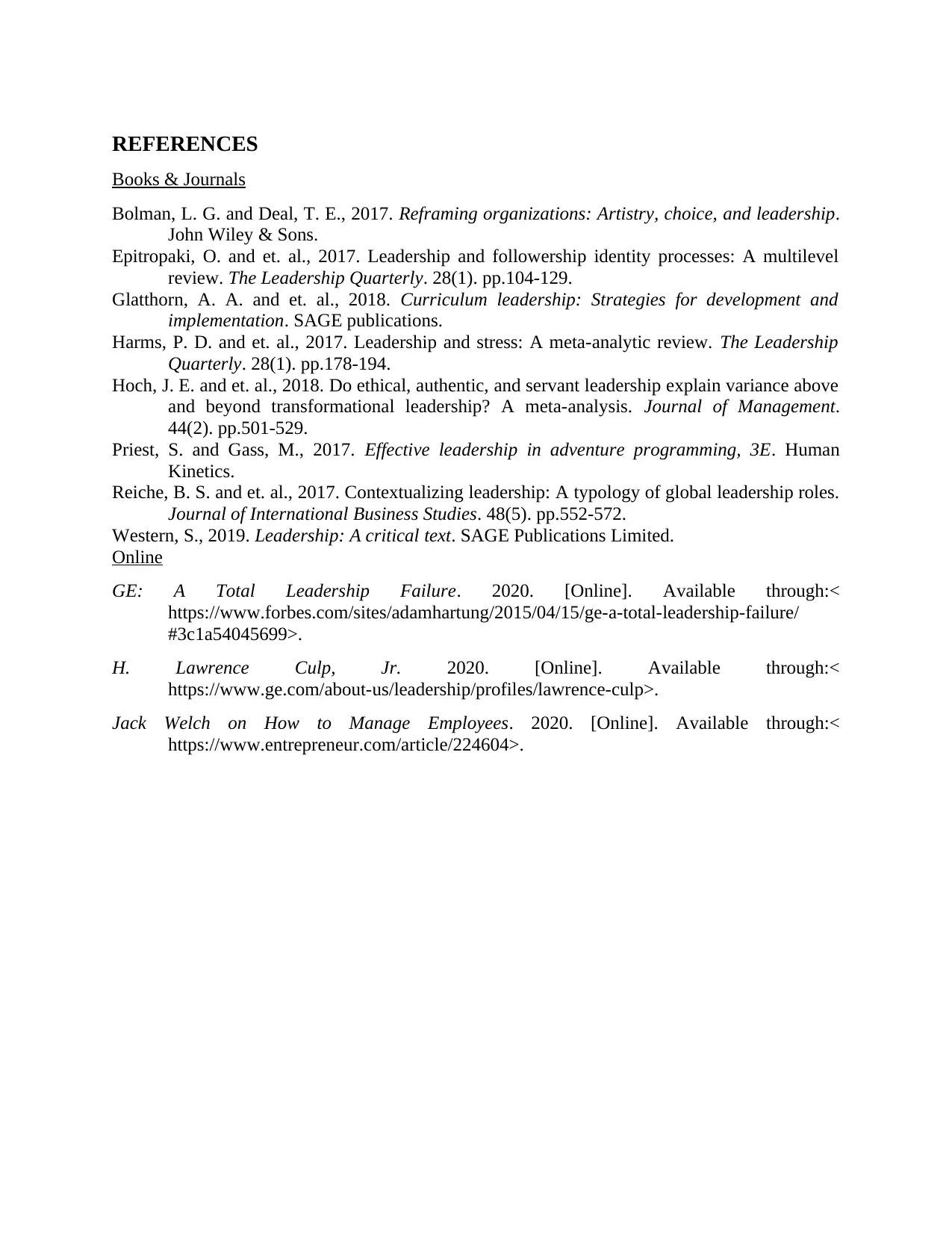
REFERENCES
Books & Journals
Bolman, L. G. and Deal, T. E., 2017. Reframing organizations: Artistry, choice, and leadership.
John Wiley & Sons.
Epitropaki, O. and et. al., 2017. Leadership and followership identity processes: A multilevel
review. The Leadership Quarterly. 28(1). pp.104-129.
Glatthorn, A. A. and et. al., 2018. Curriculum leadership: Strategies for development and
implementation. SAGE publications.
Harms, P. D. and et. al., 2017. Leadership and stress: A meta-analytic review. The Leadership
Quarterly. 28(1). pp.178-194.
Hoch, J. E. and et. al., 2018. Do ethical, authentic, and servant leadership explain variance above
and beyond transformational leadership? A meta-analysis. Journal of Management.
44(2). pp.501-529.
Priest, S. and Gass, M., 2017. Effective leadership in adventure programming, 3E. Human
Kinetics.
Reiche, B. S. and et. al., 2017. Contextualizing leadership: A typology of global leadership roles.
Journal of International Business Studies. 48(5). pp.552-572.
Western, S., 2019. Leadership: A critical text. SAGE Publications Limited.
Online
GE: A Total Leadership Failure. 2020. [Online]. Available through:<
https://www.forbes.com/sites/adamhartung/2015/04/15/ge-a-total-leadership-failure/
#3c1a54045699>.
H. Lawrence Culp, Jr. 2020. [Online]. Available through:<
https://www.ge.com/about-us/leadership/profiles/lawrence-culp>.
Jack Welch on How to Manage Employees. 2020. [Online]. Available through:<
https://www.entrepreneur.com/article/224604>.
Books & Journals
Bolman, L. G. and Deal, T. E., 2017. Reframing organizations: Artistry, choice, and leadership.
John Wiley & Sons.
Epitropaki, O. and et. al., 2017. Leadership and followership identity processes: A multilevel
review. The Leadership Quarterly. 28(1). pp.104-129.
Glatthorn, A. A. and et. al., 2018. Curriculum leadership: Strategies for development and
implementation. SAGE publications.
Harms, P. D. and et. al., 2017. Leadership and stress: A meta-analytic review. The Leadership
Quarterly. 28(1). pp.178-194.
Hoch, J. E. and et. al., 2018. Do ethical, authentic, and servant leadership explain variance above
and beyond transformational leadership? A meta-analysis. Journal of Management.
44(2). pp.501-529.
Priest, S. and Gass, M., 2017. Effective leadership in adventure programming, 3E. Human
Kinetics.
Reiche, B. S. and et. al., 2017. Contextualizing leadership: A typology of global leadership roles.
Journal of International Business Studies. 48(5). pp.552-572.
Western, S., 2019. Leadership: A critical text. SAGE Publications Limited.
Online
GE: A Total Leadership Failure. 2020. [Online]. Available through:<
https://www.forbes.com/sites/adamhartung/2015/04/15/ge-a-total-leadership-failure/
#3c1a54045699>.
H. Lawrence Culp, Jr. 2020. [Online]. Available through:<
https://www.ge.com/about-us/leadership/profiles/lawrence-culp>.
Jack Welch on How to Manage Employees. 2020. [Online]. Available through:<
https://www.entrepreneur.com/article/224604>.
1 out of 7
Related Documents
Your All-in-One AI-Powered Toolkit for Academic Success.
+13062052269
info@desklib.com
Available 24*7 on WhatsApp / Email
![[object Object]](/_next/static/media/star-bottom.7253800d.svg)
Unlock your academic potential
Copyright © 2020–2026 A2Z Services. All Rights Reserved. Developed and managed by ZUCOL.





